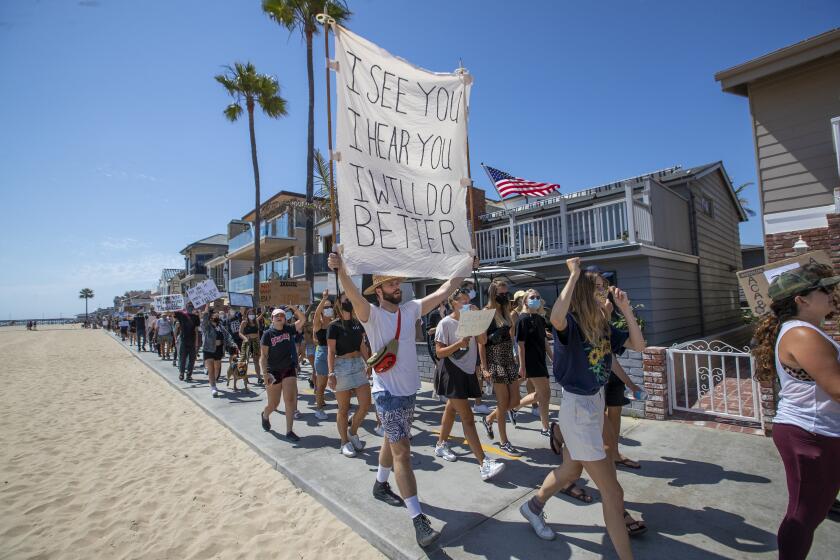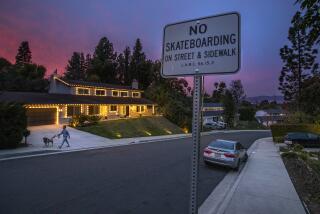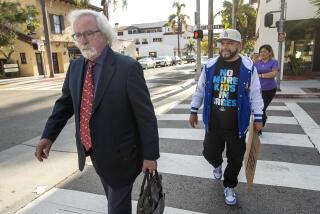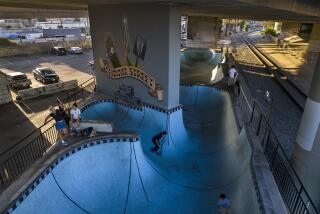Skateboarders and bicyclists hit the streets to protest racism and police violence
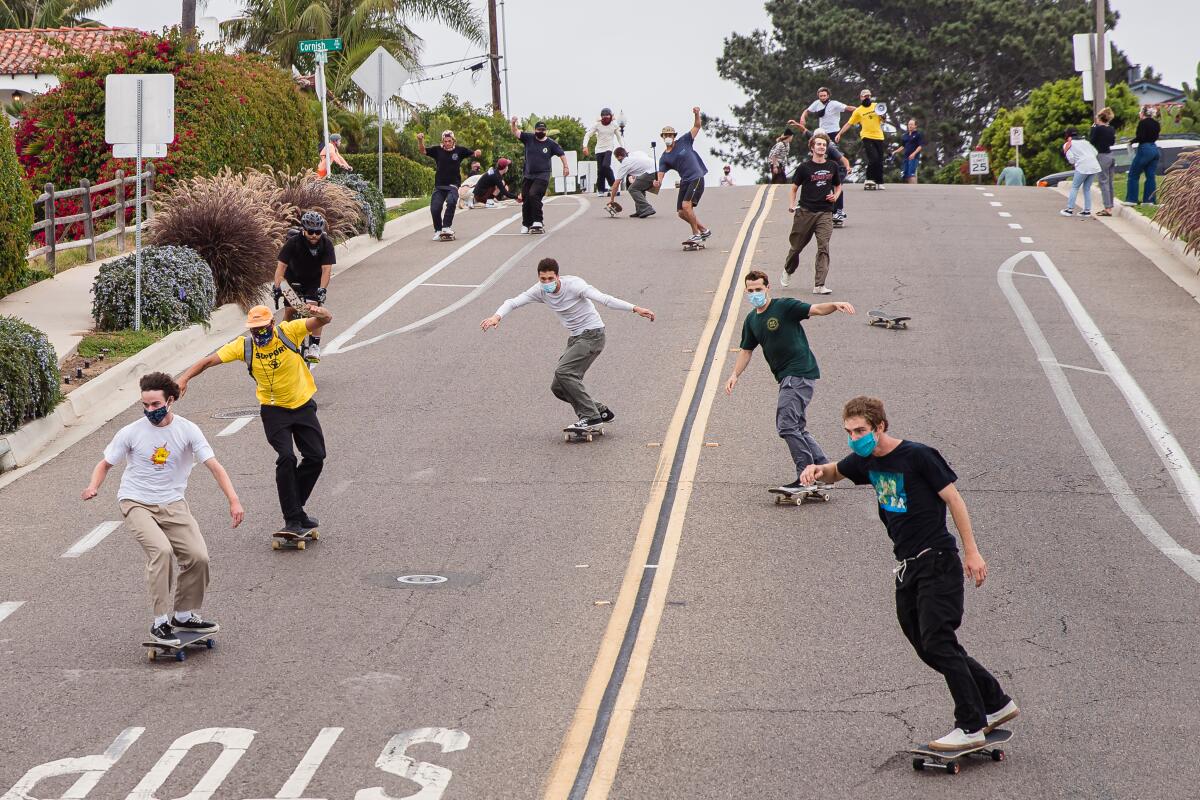
- Share via
ENCINITAS — For a few seconds on Sunday at a popular skate park in Encinitas, the gritty sound of skateboards grinding and scraping stopped while about 100 skateboarders bowed their heads in a moment of silence for George Floyd and other victims of “racist violence.”
The somber moment unfolded during a protest against racism and police brutality on Go Skateboarding Day. Co-organizer Tommy Barker noted that the protest also landed on Father’s Day and that Floyd, who died while in police custody in Minneapolis almost a month ago, left behind five children.
Moments after the silence, the group of skateboarders hit the streets, zooming down Santa Fe Drive, Vulcan Avenue and South Coast Highway, then back to the Encinitas Skate Plaza. Some held signs that read, “Black lives matter,” “They still can’t breathe” and “No justice, no peace.”
Protests over the police killing of George Floyd are springing up in more affluent, white and suburban areas than law enforcement protests have before. Experts say the trend reflects a sea change in the views of white residents.
Barker and co-organizer Mark Killigrew, who are white and live in Leucadia, said the Pushing for Peace protest was meant to empower the skateboarding community to show solidarity with the Black Lives Matter movement and take actions in hopes of creating change. They called on the skateboarders who turned out to engage in politics and vote.
“It’s been pretty common in skateboard culture to kind of not care about what’s going in current events and kind of immerse yourself in skateboarding and just ignore everything, but now things have gotten to a point where it’s unacceptable,” Killigrew said.
Barker shared a similar opinion.
“Oftentimes we don’t have these conversations at skate parks. Today I want us to,” he told the crowd as he stood in front of four large, black posters with the names of Floyd, Eric Garner and dozens of others who died in encounters with police.
Barker shared that his two new “mottos” are to be open to learning and focus on action “to make the world a better place.”
He called on others to follow Encinitas 4 Equality, a group that has called for a task force to review the city’s contract with the Sheriff’s Department to possibly redirect funds and an independent civilian panel to review cases of law enforcement misconduct. Barker also called on the crowd to support Black-owned skateboarding companies.
“This isn’t just about messaging,” he said. “This is about direct action and making your voice heard.”
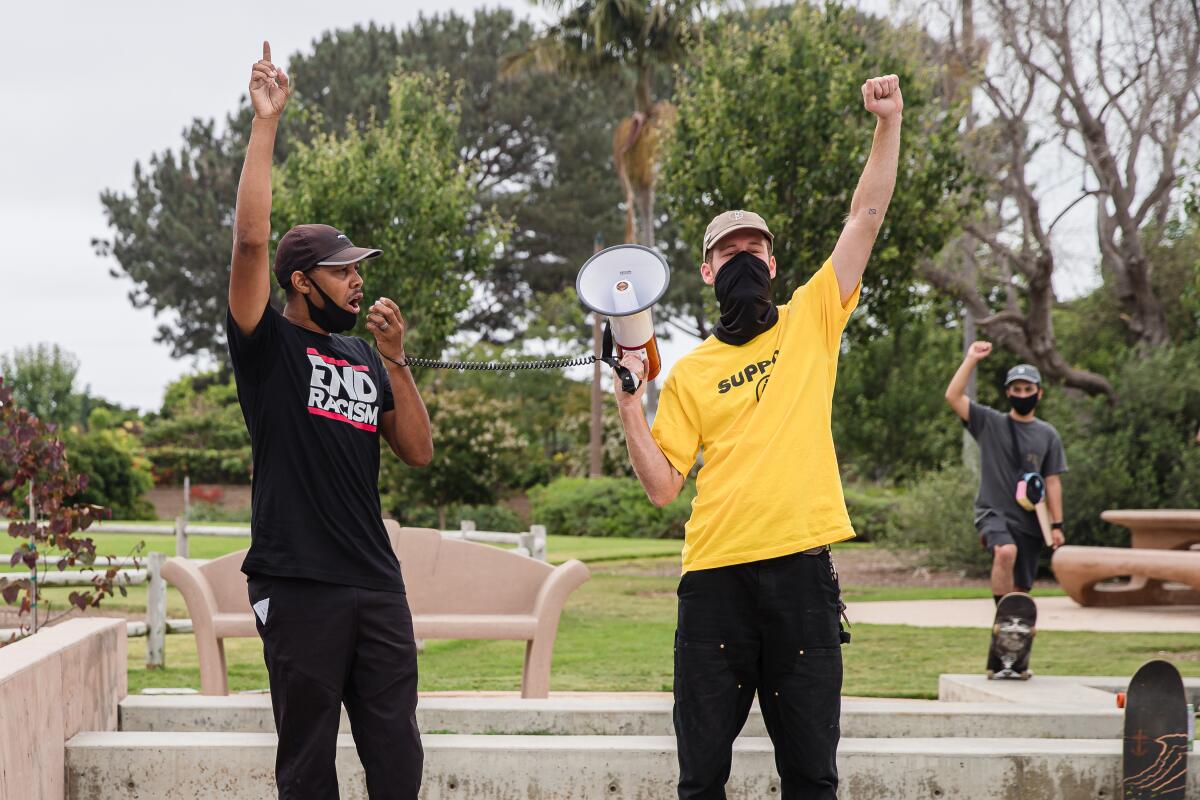
For Rod James, the protest was personal. As a Black kid who grew up skateboarding in a small town in Virginia in the ‘90s, James couldn’t escape the flack. Black kids questioned why he engaged in a predominately white world, and white kids made him feel like an outcast.
James, who shared a bit of his story with the group of skateboarders, encouraged them to listen and learn about racial issues and to love. He also called on others to speak out against injustice. He owns skateboarding companies Progress Distribution and Elenex.
“Part of the problem is we’re not using our voice,” he said. “Use your voice.”
The protest also drew some without skateboards. Linda Bolton-Rodas, an Encinitas resident and member of the predominately white group known as Stand Up for Racial Justice, said she felt it was important for people of color to see that North County residents who are white are standing up for them.
“It’s about time,” she said as she sat on a bench and watched skateboarders do tricks in the skate park, a spot some locals call Poods Park. She held a sign that called for an end to racial profiling.
The protest came a day after a larger demonstration of skateboarders in downtown San Diego.
Also Sunday, a group of a dozen bicyclists met up at the Trolley Barn Park in University Heights for a “Protest by Pedal.” Organizers said the goal was to raise awareness about racism and police violence within the predominantly white bicycling community in San Diego.
“It’s not something we can afford to be silent or neutral about any longer,” said organizer Steven Lang, 29.
The protest, which traveled a 16-mile round trip route to the County Administration Building and back, was also organized as a way to support Black-owned businesses. The route included stops at Yohed Coffee and Fiji Yogurt.
Lang acknowledged he’s had a “life of privilege” as a white man and said he’s had conversations with friends of color who have faced harassment while biking as if they had stolen their bikes or were running away from someone.
“I think it’s important for our bicycle community to break down those stereotypes that exist within itself,” Lang said. “If we can do that on a small scale within the bike community, I hope that San Diego and our nation will be able to do the same by letting go of these prejudices and stereotypes.”
More to Read
Sign up for Essential California
The most important California stories and recommendations in your inbox every morning.
You may occasionally receive promotional content from the Los Angeles Times.
